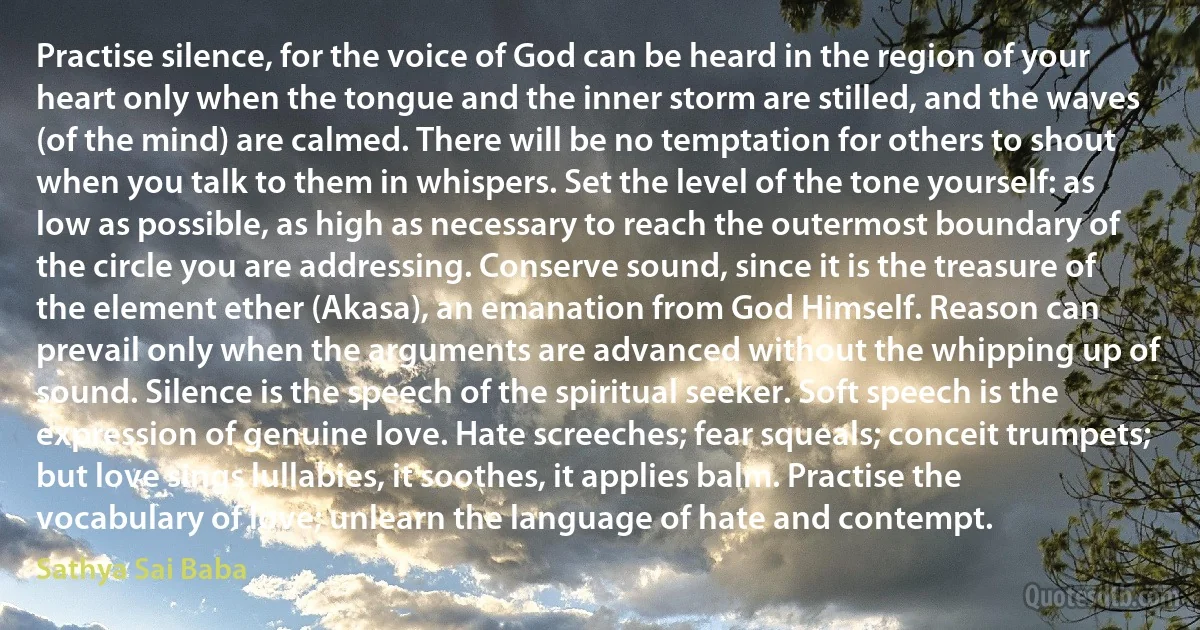
Practise silence, for the voice of God can be heard in the region of your heart only when the tongue and the inner storm are stilled, and the waves (of the mind) are calmed. There will be no temptation for others to shout when you talk to them in whispers. Set the level of the tone yourself: as low as possible, as high as necessary to reach the outermost boundary of the circle you are addressing. Conserve sound, since it is the treasure of the element ether (Akasa), an emanation from God Himself. Reason can prevail only when the arguments are advanced without the whipping up of sound. Silence is the speech of the spiritual seeker. Soft speech is the expression of genuine love. Hate screeches; fear squeals; conceit trumpets; but love sings lullabies, it soothes, it applies balm. Practise the vocabulary of love; unlearn the language of hate and contempt.
Sathya Sai BabaRelated topics
addressing contempt element emanation ether fear hate heart high language love low mind necessary outermost possible reach reason region set silence soft sound speech storm talk temptation tongue treasure voice othersRelated quotes
Behind the top hats, a little lady wearing lila-coloured tights was balancing on a tightrope in the middle of all that blue-grey tobacco-laden air. I sauntered in among the standing clientele. I was on the lookout for an attractive girl. Yes – that one wasn't bad. When she became aware of my gaze her facial expression changed to that of a frozen mask and she stared emptily into space. I found a stair – and collapsed into it – tired and listless. Everyone clapped. The Lila-clad tightrope-walker curtsied, smiled and disappeared. A group of Romanian singers took her place. There was love and hate – and longing and reunion – and lovely dreams – and that soft music melting together with the colours. The melted notes became green palm trees and steely blue water floating in the blue haze of the room. An artwork is a crystal. A crystal has a soul and a mind, and the artwork must also have these.

Edvard Munch
Upon the earth are animals and men, some in a middle region, others dwelling about the air as we dwell about the sea; others in islands which the air flows round, near the continent; and in a word, the air is used by them as the water and the sea are by us, and the ether is to them as the air is to us. Moreover, the temperament of their seasons is such that they have no disease, and live much longer than we do, and have sight and hearing and smell, and all the other senses, in far greater perfection, in the same degree that air is purer than water or the ether than air. Also they have temples and sacred places in which the gods really dwell, and they hear their voices and receive their answers and are conscious of them and hold converse with them, and they see the sun, moon, and stars as they really are, and their other blessedness is of a piece with this.

Socrates
Ancient scriptures tell us that man is more than the physical body. In fact, we have two bodies: the physical and the astral, or subtle. But we are the soul! According to the ancient Vedic scriptures of India, the size of the soul is 1/10,000 the tip of a strand of hair. It is located in the heart region and is the actual life force. The physical, as well as the astral or subtle body, acts as a covering or costume that the soul wears in its journey throughout the material sphere. As we pass from costume to costume or from body to body through the process known as reincarnation, the impressions of previous lives imprint themselves on the subtle body and are carried with us during each lifetime. In the dream state, activity in the subtle body becomes more dominant than activity in the physical body. Our dream experiences are often impressions accumulated from many lifetimes.

Bhakti Tirtha Swami
For what advantage is it, that the world enjoys profound peace, if thou art at war with thyself? This then is the peace we should keep. If we have it, nothing from without will be able to harm us. And to this end the public peace contributes no little: whence it is said, ‘That we may lead a quiet and peaceable life.' But if any one is disturbed when there is quiet, he is a miserable creature. Seest thou that He speaks of this peace which I call the third (inner, ed.) kind? Therefore when he has said, ‘that we may lead a quiet and peaceable life,' he does not stop there, but adds ‘in all godliness and honesty.' But we cannot live in godliness and honesty, unless that peace be established. For when curious reasonings disturb our faith, what peace is there? or when spirits of uncleanness, what peace is there?

John Chrysostom
Hatred is a thing of the heart, contempt a thing of the head. Hatred and contempt are decidedly antagonistic towards one another and mutually exclusive. A great deal of hatred, indeed, has no other source than a compelled respect for the superior qualities of some other person; conversely, if you were to consider hating every miserable wretch you met you would have your work cut out: it is much easier to despise them one and all. True, genuine contempt, which is the obverse of true, genuine pride, stays hidden away in secret and lets no one suspect its existence: for if you let a person you despise notice the fact, you thereby reveal a certain respect for him, inasmuch as you want him to know how low you rate him - which betrays not contempt but hatred, which excludes contempt and only affects it. Genuine contempt, on the other hand, is the unsullied conviction of the worthlessness of another.

Arthur Schopenhauer
